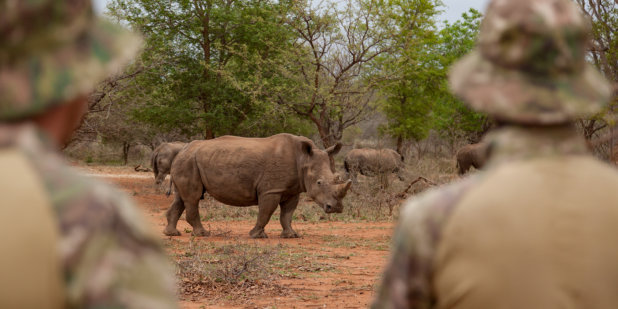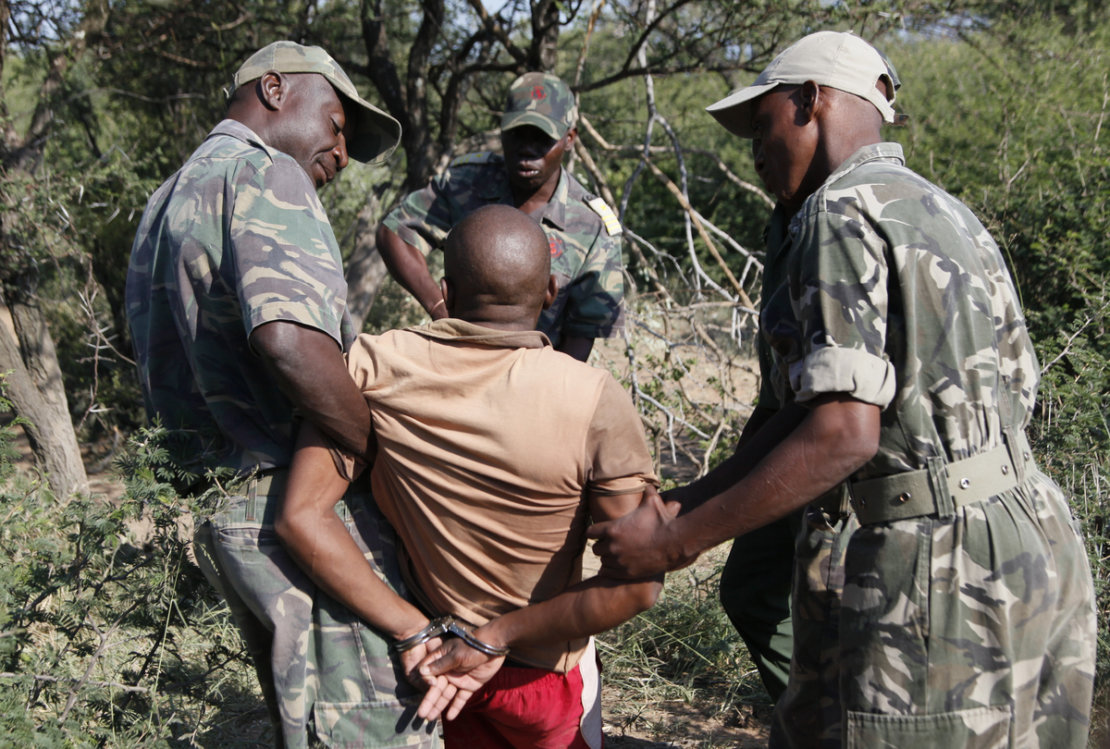- About
- Topics
- Picks
- Audio
- Story
- In-Depth
- Opinion
- News
- Donate
-
Signup for our newsletterOur Editors' Best Picks.Send
Read, Debate: Engage.


Tumi Morena has become one of South Africa's best anti-poaching rangers – but this also come at a price. People from Tumi's community see him as an intruder because he works for the white man.
He was once locked up in jail and left to share a cell with the poachers he arrested. The poachers started making noise, folding blankets, using them as drums and singing all at once – the racket is made to blur the sounds of cellmates being beaten or tortured. Tumi was sitting in the corner and waiting for it to happen. He was lucky that night, it didn't happen due to a paper bag with Kentucky Fried Chicken.
Tumi Morena, Anti-Poaching Ranger at RHINO FORCE and Vince Barkas, Founder of ProTrack Wildlife Protection
Tumi has come a long way from growing up in a small village in the bush with no school education, no books, no literacy. Ten years ago he joined ProTrack, the anti-poaching organisation that trained him until he moved on to Hemmersbach Rhino Force, which also works closely with his previous employer.
These years of education and everyday practice in wildlife, living with the animals as well as finding their carcasses changed him. It might take a whole new generation to pass on until they understand why Tumi is doing what he does.
In a way, he impersonates the gap between the poor in his community who worry about food for the next day, and the privileged, mostly white, who simply purchase meat. Tumi should be considered a role model but he is not – at least not for the young black men in South Africa's rural areas. He remains an inspiration only for the white young men, who would like to become anti-poaching rangers like him.
Poaching is an immense temptation for young men who have nothing. Even for a ranger who earns 4,000 Rand a month, it's hard to resist the 500,000 Rand reward by simply guiding a poacher to where the rhinos are.
When asked what the rhino means to him, Tumi pauses for a long moment. Ten years ago when he aspired to become an anti-poaching ranger, Tumi admits he didn't think of protecting wildlife a priority, but considered the other rangers in their uniform, with their guns, as soldiers. For years he trained, experienced wildlife, learned to read and educated himself. His relation to wild animals changed and developed an emotional connection. He stopped seeing them just as food or tools; he finally saw why protecting the wildlife is essential. Having spent ten years in the wilderness – risking his life to protect the rhino – has transformed Tumi's mindset in regards to Africa and his country.
"It's my heritage! It's our animal! It's The last dinosaur left in Africa. It's ours! Of us Africans. It's mine! It means Africa. Without them, what are we? If they all go away, what then?"
Tumi Morena
Africa holds an unimaginable asset. What has been marginalised in almost all continents of the earth, still exists in Africa – wildlife. It could be an endless resource of cultural heritage, income from tourism, and maybe most importantly, a progressive way to cultivate a lifestyle that is based on harmony between wilderness and civilisation. A mindset and a way of living that the modern world lost a long time ago.
But Tumi's culture was broken by invasion, colonisation; of plundering of Africa and enslavement of Tumi's ancestors for centuries.
"Everything is up for grab. Africa is being raped again. You Europeans have come in and colonised Africa and raped it. Everybody has had a turn – now it's the Chinese. that's been in the history of Africa. And it's the exact same thing with the rhino horn. It's nothing new."
Vincent Barkas
Vince Barkas about the extinction of wildlife, its causes and significance
In South Africa, the state of colonisation as the deprivation of black people was frozen through apartheid until 1990. The release of Nelson Mandela marked the beginning of a new era with high hopes, which seemed to fulfil in the early days of the Rainbow Nation. Conditions partially changed in urban areas, but the promises to improve black peoples' lives in rural areas are still waiting to be realised. The frustration of people is the breeding ground for crime, corruption – and poaching.
Vince Barkas about the need and the difficulty to involve communities at the borders of reserves in wildlife conservation
People in black communities have been, and continue to be deprived. Dreams of a better future are met with scarce opportunities to develop real ambitions. In rural areas jobs are rare. Stagnation, poverty and powerlessness manifest in a society of injustice. The difference between privileged and deprived people – particularly in rural areas – is still marked by the colour of skin, an arduous precondition to conduct wildlife conservation, a task that is regarded as the 'white man's business'.
It's not just about the guns, the training and having rangers in the field to protect wildlife, social injustice, as in any society, needs to be addressed urgently and comprehensively to provide opportunities to people, especially those who live next to reserves. This means to develop models that involve communities in conservation and support and promote the ones who have jobs regardless of their colour.
"Mandela coming out of jail made me feel much better as a white racist because he forgave me, but it hasn't done much of a difference for a black person."
Vincent Barkas
In South Africa's rural areas, up to 14 people depend on one person's income. Arresting one poacher causes a sinkhole-like loss in communities' economical chain, and poachers who are killed, quite rightly, worsens the situation and creates resentments beyond the economic disruption.
The widespread shoot-to-kill attitude in South Africa adds a burden to any attempt to raise awareness for conservation. Law enforcement is dysfunctional due to corruption and lack of resources, especially in rural areas. Properly done it requires sufficient coverage, skilled, well-equipped and law-abiding officers who are disciplined when it comes to pulling the trigger – all of which are absent from the law enforcement in the country.
Vince Barkas about the need for differentiated awareness on the poaching problem
If anti-poaching, conservation and wildlife business worked together and involved communities as much as possible, the effect could be turned around. Instead of economic deprivation, people could make a living; instead of alienation and resentment, communities could embrace wildlife and conservation.
An intact wildlife is a basis for income from tourism. Premium lodges hire up to ten staff members per guest. A lodge with 30 guests would employ up to 300 in staff. 300 people making a living and supporting a number of others can make a big difference for communities in rural areas.
In contrast to poaching, wildlife tourism is a sustainable economic model. The challenge, however, is that people are hungry today. How long will it take to deploy such a strategy, and equally important, will wildlife survive until then?
As the experienced anti-poaching undertaker Vince Barkas said: "This is Africa's lost end. If we don't solve the extinction problem in my lifetime, wildlife will be lost forever."
With the loss of its wildlife, Africa would lose a much larger battle of heritage, cultural identity and uniqueness.